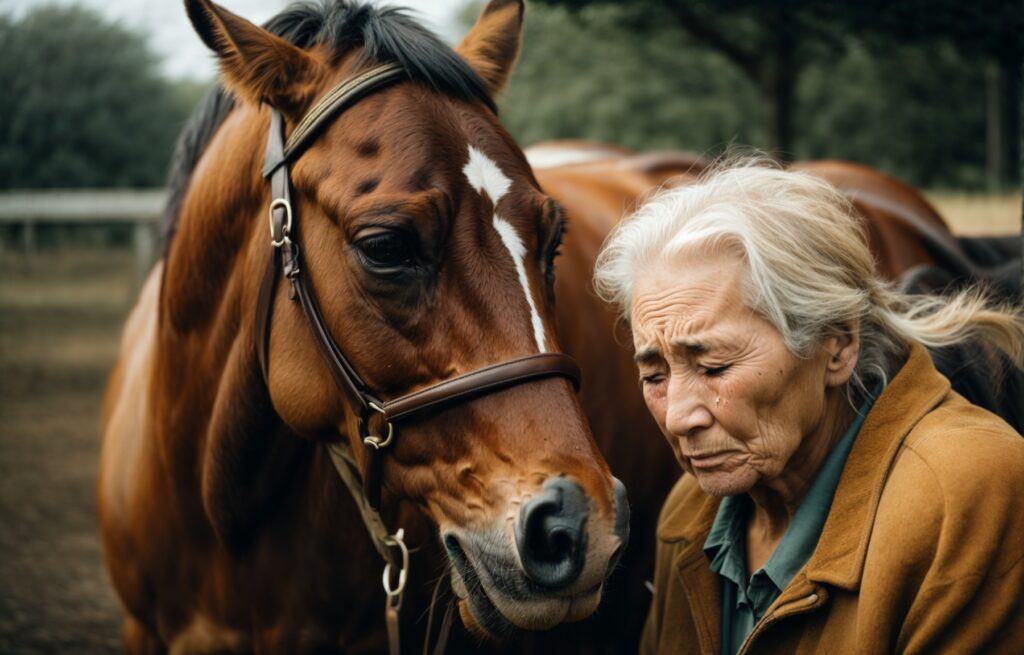Horses have long been recognized for their remarkable role as therapy animals, providing support and therapeutic benefits to individuals in need. In the practice of equine therapy, also known as equine-assisted therapy, horses are used in interactions with individuals to achieve rehabilitative goals under the guidance of medical professionals. This unique form of therapy has been proven to be effective in helping individuals with various psychological issues, including addiction, trauma, and depression.
One of the reasons why horses are particularly effective in therapy is their ability to serve as emotional mirrors for humans. Through their intuitive nature, horses can sense and reflect human emotions, helping individuals to better understand and process their feelings. This can greatly contribute to the healing and personal growth of the individuals involved in equine therapy.
Working with horses also offers individuals the opportunity to develop valuable life skills. In equine therapy, individuals learn to cultivate a strong work ethic, trust, and self-awareness through their interactions with these majestic animals. The bond that forms between horses and humans during therapy sessions can be transformative, providing a safe and accepting environment for individuals to express themselves.

Equine therapy has shown positive results in various cases, including the recovery from substance abuse, trauma healing, and alleviating symptoms of depression and other mental health issues. The non-judgmental support provided by horses plays a crucial role in the success of therapy sessions, creating an environment where individuals feel understood and accepted.
It is important to note that the professionalism of the therapists and the safety of the therapy sessions are key factors in the effectiveness of equine therapy. Qualified professionals ensure that the therapy is conducted in a secure and controlled environment, maximizing the benefits for the individuals involved.
Key Takeaways:
- Horses are used as therapy animals in equine therapy, providing support and therapeutic benefits to individuals.
- Equine therapy can help individuals with psychological issues such as addiction, trauma, and depression.
- Horses serve as emotional mirrors, helping individuals identify and process their feelings.
- Working with horses helps individuals develop important life skills such as trust and self-awareness.
- Equine therapy has shown positive results in cases of substance abuse recovery, trauma healing, and mental health issues.
The Benefits of Equine Therapy
Equine therapy offers a wide range of benefits, making it a valuable form of treatment for individuals seeking emotional and psychological healing. Through interactions with horses, this unique therapy approach, also known as equine-assisted therapy or horse-assisted therapy, can have a profound impact on those struggling with addiction, trauma, depression, and other mental health issues.
During equine therapy sessions, individuals have the opportunity to develop a special bond with horses, which can serve as emotional mirrors. Horses are incredibly perceptive creatures, capable of sensing human emotions and providing a safe and accepting environment for individuals to express themselves. They offer non-judgmental support, allowing individuals to explore their feelings and learn how to better understand and process their emotions.
Furthermore, the benefits of working with horses extend beyond the emotional realm. Equine therapy can also aid in the development of important life skills. Interacting with horses requires patience, trust, and effective communication, helping individuals cultivate a strong work ethic and learn valuable lessons in responsibility and self-awareness.
| Benefits of Equine Therapy: |
|---|
| 1. Emotional support and understanding from non-judgmental animals |
| 2. Opportunities for self-reflection and personal growth |
| 3. Development of important life skills such as trust and communication |
| 4. Improvement in symptoms of depression, anxiety, and trauma |
“Equine therapy has been transformative for me. It provided a safe space for me to connect with horses and work through my past traumas. Through the bond I formed with the horses, I gained a renewed sense of self and learned important skills that have carried over into my daily life.”
Equine therapy has proven to be effective in achieving positive results for individuals recovering from substance abuse, trauma, and other psychological issues. The connection established between humans and horses during therapy can lead to significant breakthroughs and provide individuals with a sense of empowerment and healing.
It is important to note that the success of equine therapy relies on the professionalism of the therapists and the safety of the therapy sessions. Qualified and trained professionals ensure that the therapy environment is conducive to growth and that the well-being of both the individual and the horse is prioritized.
Equine therapy offers a holistic and impactful approach to healing and personal growth. The benefits of working with horses are numerous and extend beyond traditional forms of therapy. Through their unique abilities and the special bond they form with humans, horses have the power to facilitate emotional healing, teach valuable life skills, and provide unconditional support. Equine therapy holds immense potential in helping individuals overcome various challenges and find renewed strength and resilience.

The Unique Bond between Horses and Humans
The connection between humans and horses during therapy sessions is nothing short of extraordinary, with horses providing a safe space for emotional exploration and growth. Equine therapy, also known as horse-assisted therapy, utilizes the unique abilities of horses to connect with individuals on a deep level, helping them to heal and develop important life skills.
During therapy sessions, horses serve as emotional mirrors for humans, reflecting their feelings and providing a non-judgmental environment for self-discovery. Horses have a remarkable ability to sense human emotions, allowing them to respond and provide the support that individuals need. This emotional connection between horses and humans can be transformative, helping individuals to better understand and process their feelings in a safe and supportive setting.
Working with horses in therapy also cultivates important life skills such as trust and self-awareness. Horses are highly intuitive animals and require individuals to develop a strong sense of trust in order to establish a successful partnership. Through these interactions, individuals learn to communicate effectively, set boundaries, and build relationships based on trust and mutual respect. Additionally, the presence of horses encourages individuals to become more self-aware, as horses respond to their authentic emotions and behaviors.
Equine therapy has shown positive results in assisting individuals dealing with a wide range of psychological issues, including addiction, trauma, and depression. The professionalism of therapists and the safety of therapy sessions are crucial to the effectiveness of equine therapy. With the guidance of qualified professionals, individuals can experience the transformative power of horses as therapy animals, fostering personal growth, and facilitating positive change.
Life Skills Development through Equine Therapy
Beyond emotional healing, equine therapy offers individuals an opportunity to develop crucial life skills that can have a lasting impact on their personal and professional lives. Interacting with horses in a therapeutic setting allows individuals to cultivate a strong work ethic, trust, and self-awareness.
Working with horses requires dedication and commitment. The responsibility of caring for and connecting with these magnificent animals fosters a sense of purpose and determination. Through hands-on activities such as grooming, feeding, and riding, individuals learn the importance of consistency, patience, and perseverance. They develop a work ethic that can be transferred to various aspects of their lives, including their careers and relationships.
Horses are incredibly perceptive beings, capable of sensing human emotions and intentions. In equine therapy, individuals learn to communicate and build trust with these animals, which translates into their ability to establish meaningful connections with others. Building rapport with horses teaches individuals the value of trust, mutual respect, and effective communication. These skills not only enhance personal relationships but also improve professional interactions and leadership abilities.

The Power of Self-Awareness
Equine therapy promotes self-awareness by providing individuals with immediate and honest feedback. Horses react to the energy and emotions of the people around them, acting as emotional mirrors. Through their reactions, individuals gain insight into their own feelings and behaviors, allowing them to better understand and process their emotions. This heightened self-awareness contributes to personal growth and empowers individuals to make positive changes in their lives.
The Table of Life Skills Developed through Equine Therapy
| Life Skills | Description |
|---|---|
| Work Ethic | Developing a strong sense of dedication and commitment through caring for and connecting with horses. |
| Trust | Learning to build trust with horses, which can be transferred to establishing trusting relationships with others. |
| Self-Awareness | Gaining insight into one’s own emotions and behaviors through the honest feedback provided by horses. |
| Effective Communication | Developing the ability to communicate clearly and effectively, leading to improved personal and professional interactions. |
Equine therapy goes beyond emotional healing, offering individuals the opportunity to develop essential life skills. Whether it’s building a strong work ethic, fostering trust, cultivating self-awareness, or improving communication, the transformative power of working with horses can positively impact all areas of life. Through equine-assisted therapy, individuals are empowered to navigate challenges, strengthen relationships, and achieve personal growth.
Horses, as therapy animals, offer a profound level of acceptance and understanding, creating a space where individuals can freely explore their emotions without fear of judgment. Equine therapy, also known as equine-assisted therapy or horse therapy, harnesses the unique ability of horses to sense human emotions and provide a safe and accepting environment for individuals to express themselves.
During therapy sessions, horses serve as emotional mirrors, reflecting the inner emotions of the individuals they interact with. They offer a genuine and non-judgmental presence that allows individuals to connect with their feelings and gain a deeper understanding of themselves. This deep bond between horses and humans can be therapeutic, providing comfort, solace, and a sense of connection.
Equine therapy has been particularly effective in helping individuals with mental health issues. The horses’ innate ability to sense emotions can provide a powerful source of support and validation for those struggling with depression, anxiety, or trauma. Interacting with horses can help individuals develop coping mechanisms, build self-esteem, and improve social skills. It offers a unique avenue for healing and personal growth.
By working with horses, individuals also develop important life skills. Trust, patience, responsibility, and self-awareness are cultivated through the connections and interactions with these gentle creatures. Horses teach us to be present, to communicate effectively, and to establish boundaries. The lessons learned in the arena can translate into everyday life, enabling individuals to navigate challenges with resilience and confidence.
| Benefits of Horses as Therapy Animals |
|---|
| Provides a safe and accepting environment for emotional exploration |
| Serves as emotional mirrors, helping individuals gain self-awareness |
| Aids in the development of coping mechanisms and social skills |
| Fosters trust, responsibility, and self-esteem |
Equine therapy is a powerful tool in the field of mental health. It offers individuals the opportunity to connect with animals in a deeply meaningful way, tapping into the healing power of the human-animal bond. The professionalism and safety of equine therapy sessions are essential for its effectiveness, ensuring that individuals feel supported and their well-being is prioritized.
Success Stories and Positive Results
Numerous success stories and research studies have demonstrated the positive impact of equine therapy on individuals recovering from various emotional and psychological challenges. Equine-assisted therapy, commonly known as horse therapy, has shown remarkable results in helping individuals overcome addiction, trauma, and depression.
One success story involves Emily, a survivor of a traumatic event. Through equine therapy, she was able to establish a deep emotional connection with her therapy horse, Daisy. As Emily groomed and rode Daisy, she found solace in the horse’s non-judgmental presence, allowing her to gradually process her trauma and regain control over her emotions. Equine therapy provided the safe space and companionship she needed to heal.
“Working with horses has been truly transformative for me. They have this incredible ability to sense my emotions without judgment, which has helped me open up and face my past. The connection I’ve built with my therapy horse has been a crucial part of my healing journey.” – Emily
Research studies have also shown the effectiveness of equine therapy in addiction recovery. In a recent study conducted by the Equine Assisted Growth and Learning Association (EAGALA), it was found that participants who engaged in equine therapy as part of their substance abuse treatment demonstrated improved self-esteem, increased emotional regulation, and decreased relapse rates.
| Benefits of Equine Therapy in Addiction Recovery | Research Study |
|---|---|
| Enhanced self-awareness and emotional regulation | EAGALA |
| Improved interpersonal skills and communication | PubMed Central |
| Reduced stress and anxiety levels | Nature Publishing Group |

Equine therapy not only provides individuals with a safe and supportive environment but also offers valuable opportunities for personal growth and skill development. Through interaction with horses, participants learn important life skills such as trust, responsibility, and effective communication. The process of caring for and connecting with these majestic animals fosters qualities that extend beyond the therapy session, ultimately leading to improved overall well-being.
Equine therapy has proven to be a powerful approach in the field of mental health, allowing individuals to heal and thrive. The combination of the unique bond between horses and humans, their ability to mirror emotions, and the development of essential life skills makes equine therapy a transformative and effective treatment option. The success stories and research studies serve as a testament to the profound impact horses can have on the lives of individuals seeking emotional and psychological healing.
The Importance of Professionalism and Safety in Equine Therapy
The effectiveness of equine therapy relies on the expertise of qualified therapists and the establishment of safe and secure therapy sessions. A professional therapist with a deep understanding of equine-assisted therapy can guide individuals through their healing journey, ensuring that the therapy is tailored to their specific needs. They are trained to observe and interpret the interactions between the individual and the horse, allowing for a personalized and effective treatment plan.
Equine therapy sessions must also prioritize safety to ensure the well-being of both the individuals and the horses. Proper safety measures, such as wearing appropriate gear and ensuring a controlled environment, are essential. Qualified therapists are trained to handle any potential risks or emergencies that may arise during the therapy sessions.
By maintaining professionalism and safety in equine therapy, individuals can fully benefit from this unique form of treatment. The therapeutic bond that develops between a person and a horse can be transformative, leading to improved mental health and personal growth. Through equine therapy, individuals can develop a sense of trust, emotional connection, and self-awareness, which are crucial for their overall well-being.
| Benefits of Professionalism and Safety in Equine Therapy |
|---|
| 1. Personalized treatment: Qualified therapists can tailor the therapy sessions to suit the individual’s specific needs, optimizing the effectiveness of the treatment. |
| 2. Safe environment: Prioritizing safety in equine therapy ensures the well-being of both the individuals and the horses involved, minimizing any potential risks. |
| 3. Transformative results: By maintaining professionalism and safety, equine therapy can lead to improved mental health, personal growth, and the development of essential life skills. |

In conclusion, equine therapy offers a powerful avenue for healing and personal development. The success of this therapy relies on the expertise of qualified therapists who create a safe and secure environment for individuals to connect with horses. By prioritizing professionalism and safety, equine therapy can help individuals overcome psychological challenges, build resilience, and embark on a transformative journey of self-discovery.
Conclusion
Horses play a vital role as therapy animals, providing individuals with a unique opportunity for healing, growth, and emotional connection. Equine therapy, also known as equine-assisted therapy, involves interactions between a person and a horse under the supervision of a medical professional. This form of therapy has been proven effective in helping individuals with a variety of psychological issues, including addiction, trauma, and depression.
One of the reasons horses are so effective in therapy is their ability to serve as emotional mirrors for humans. They can sense and reflect human emotions, allowing individuals to better understand and process their feelings. Through this unique connection, horses provide a safe and accepting environment for individuals to express themselves and work towards healing.
Furthermore, working with horses in therapy sessions helps individuals develop important life skills such as trust, self-awareness, and a strong work ethic. Horses require trust and respect, and as individuals interact with them, they learn to build these qualities within themselves. The experience of caring for and interacting with such a powerful and gentle animal can have a profound impact on personal growth.
Equine therapy has shown positive results in numerous cases, with individuals recovering from substance abuse, trauma, and other psychological issues. The success stories are a testament to the effectiveness of this therapy approach. However, it is important to note that professionalism and safety are key factors in ensuring the success of equine therapy. Qualified therapists and a safe environment are essential to provide the best possible outcomes for individuals participating in equine therapy.
FAQ
Why are horses used as therapy animals?
Horses are used as therapy animals because of their unique ability to connect with individuals and contribute to healing and personal growth. They can serve as emotional mirrors, helping people better understand and process their feelings.
What are the benefits of equine therapy?
Equine therapy has numerous benefits, including aiding in addiction recovery, trauma healing, and alleviating symptoms of depression and other mental health issues. Interacting with horses can have a profound impact on individuals’ well-being.
How do horses help in equine therapy?
Horses help in equine therapy by creating a unique bond with humans. They sense human emotions and provide non-judgmental support, allowing individuals to feel safe and accepted. They can also help individuals develop important life skills such as trust and self-awareness.
What life skills can be developed through equine therapy?
Equine therapy helps individuals develop a strong work ethic, trust, and self-awareness. Working with horses requires responsibility and commitment, which can translate into valuable life skills outside of therapy sessions.
How do horses provide non-judgmental support?
Horses provide non-judgmental support by sensing human emotions and responding without judgment. They create a safe and accepting environment where individuals can express themselves freely and without fear of being judged.
Are there any success stories and positive results from equine therapy?
Yes, there are numerous success stories and positive results from equine therapy. It has been effective in helping individuals recover from substance abuse, trauma, and other psychological issues. Many people have experienced significant improvements in their well-being through equine therapy.
How important is professionalism and safety in equine therapy?
Professionalism and safety are crucial in equine therapy to ensure its effectiveness. Qualified therapists who adhere to ethical guidelines and provide a safe environment for therapy sessions are essential for the well-being of individuals and the success of the therapy.




